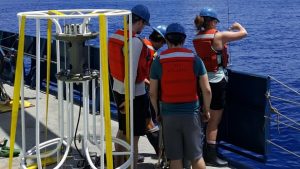Arsenic is toxic to almost all life forms, but now researchers at the University of Washington have discovered that some microbes in the Pacific Ocean not only tolerate the stuff, but actively breathe it. The discovery has implications for how life may adapt to a changing climate, as well as where we might find it on other planets.
Oxygen plays a vital role in every cell in your body, as well as the bodies of many other organisms. We use it to chemically change the food we eat and the liquids we drink into energy that then powers every other function in the body. But in environments where there isn’t much oxygen to spare, some crafty creatures have evolved to make use of other elements, most commonly nitrogen or sulfur. In this case, that environment was a particular part of the ocean.
“In some parts of the ocean there’s a sandwich of water where there’s no measurable oxygen,” says Gabrielle Rocap, co-author of the study. “The microbes in these regions have to use other elements that act as an electron acceptor to extract energy from food.”
Read more HERE
Ask me anything
Explore related questions





